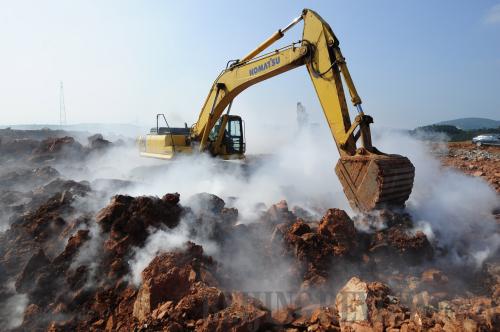|
 |
|
DETOXIFICATION: Cleanup of the site of a former chemical plant in Danjiangkou, Hubei Province, is underway on June 25 (HAO TONGQIAN) |
The legal interpretation states that a person can be held criminally liable if he or she is responsible for pollution that seriously injures a person, while the previous benchmark said that the pollution must have resulted in death. Pollution activities which force the evacuation of over 5,000 people or poison more than 30 people will be defined as crimes, according to new stipulations.
The latest interpretation has added new activities as criteria for the crime of impairing the protection of the environment and resources.
For instance, discharging or dumping radioactive, infectious or toxic waste into sources of drinking water or nature reserves will be prosecuted as a criminal offense rather than a merely regulatory or civil legal affair.
Sun explained that the new criteria would convict the offenders not only for the damage they do but also for the practice of polluting.
According to China's Criminal Law, those convicted of such crimes will face a maximum prison term of seven years plus fines.
"This is a sign of progress of the Chinese judiciary in fighting against environmental pollution, as it can prevent pollution from the beginning by giving potential polluters a warning," said Wang Jin, an environmental law professor at Peking University.
Chinese law previously lacked a clear stipulation on what activities could result in such criminal charges, said Hu Yunteng, Director of the SPC's Research Department.
Han Yaoyuan, Deputy Director of the SPP's Research Department, said that prosecutors will also pay attention to investigating the criminally negligent behavior behind environmental pollution crimes.
"Prosecuting departments at every level will investigate the cases involving turning a blind eye toward pollution or making fines instead of making criminal punishment," he said.
An updated law
In late June, a draft amendment to China's Environmental Protection Law was also deliberated by the national legislature to include harsher punishments for polluters.
The draft was submitted for the second reading to the bimonthly session of the Standing Committee of the National People's Congress (NPC), which was held on June 26-29. The attempt to amend the Environmental Protection Law was considered an important part of the country's comprehensive efforts to conserve resources and curb pollution.
The law has not been revised since it took effect in 1989. However, over the past two decades, the country has faced worsening pollution problems and the public has become less tolerant of environmental hazards.
The draft imposed harsher punishments for polluters and highlighted the public's right to know and participate, compared with the version that was put on the table for first reading in August last year.
It proposed the imposition of severe financial penalties on polluting companies. Dumping sewage and failing to modify discharge and emissions to meet national standards, will subject companies to fines based on an increasing daily rate, the draft stipulated. The current law stipulates that polluters are subject to a one-time penalty of up to 200,000 yuan ($32,600).
If passed, the article would be the toughest penalties that a polluting company has ever faced, legal experts say.
A new chapter was also added to protect the public's right to know concerning environmental information. According to the draft, governments at all levels should publicize environmental information and facilitate the participation of and supervision by citizens and organizations in environmental protection. Polluters are required to publish the information about the pollutants they discharge and how they act to control the pollution.
Stronger enforcement of the current environmental impact assessment (EIA) system is also proposed. Projects that do not have an EIA should not start construction, and those that do commence construction without one may be required to halt and restore the site, the draft said.
This is the first time such a requirement has been proposed.
The draft also required greater public involvement during the EIA process. It stipulated that operators should solicit public opinion on their projects, before submitting the EIA report to local authorities. Local environmental protection authorities, in turn, have to release the report on their website in a timely manner.
China's EIA system has been criticized as a mere formality and lacking deterrent power after it was made mandatory in 2003.
"These newly added clauses are very detailed and important. The requirement that companies putting together an environmental impact assessment have to engage the public represents huge progress," said Wang Xi, an environmental law expert at Shanghai Jiaotong University.
| 